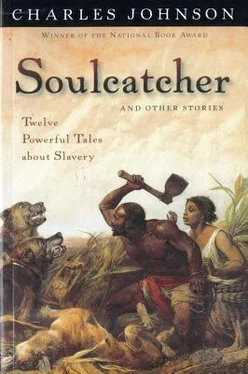But I prayed for him, yes. And for myself (11 Timothy 2:1–3), for the removal of my anger. For does not the Light of the World tell us that we must forgive seven times seventy, if need be?
AUGUST 12,1793
MONDAY, 8:45 P.M.
Just returned from making my rounds to the sick. Walked this morning at approximately 7 A.M. into the palatial home of a woman well known in Philadelphia for the lavish parties she holds in her ballroom. Everywhere my gaze fell I saw wealth. A chandelier, for example, that would pay for the building of ten Bethels. Furniture imported from France. I am certain this woman does not dwell often on Matthew 6:27, where it is written, "Which of you by taking thought can add one cubit unto his stature?" Her servant, a colored girl in my congregation, led me up the quarter-turn stairs to the woman's bedroom, where she lay semiconscious, emaciated as a skeleton. I could tell the disease was far along with her. Most likely, she was bleeding internally. Most of her golden hair — now stiff as straw — had fallen out onto her pillow. I began unpacking the apothecary case Dr. Rush had given me, laying out glass vials of various medicines, the little weighing scale, and instruments necessary for cupping. The old woman began to rouse. Seeing me, that I was a Negro — and one in her bedroom no less-she began to scream, shouting, " Get out! Get out! "
I repacked my case and promptly left. I did not plead with her or beg for the opportunity to save her life so that she could begin plans for her next party. Later in the day, through her servant girl, I was informed of her passing at 4 P.M. Perhaps God has sent this plague for the same reason His wrath destroyed Sodom. To cleanse our city of human corruption…
SEPTEMBER 1, 1793
SUNDAY, 7:00 P.M.
I have been ill, feverish for the last few weeks. Unable to write in addition to my other duties. It is not true that the plague bypasses people of color. For our numbers in Philadelphia, as many Negroes have perished as whites. What, then, heavenly Father, do you want us to learn from this unending devastation?
SEPTEMBER 12, 1793
THURSDAY, 4:18 P.M.
As I promised him, I again visited earlier this afternoon with Dr. Benjamin Rush, and as always our time together was uplifting. I cannot condemn white people precisely because I know someone like the good doctor. From the beginning he supported our black agents of mercy during this epidemic, and he could have fled Philadelphia along with the reportedly twenty thousand others who have abandoned the city, but being a true physician, and man of God, he remained during these months when his services were most needed.
I was discouraged to see, however, that the yellow pallor was upon his face this afternoon. He looked feverish, weakened by his own bout with the disease, and so I begged him not to stand, as he was struggling to do, when I entered his parlor. Slowly, he settled back against the cushions, perspiration beading along his brow, and tried to smile. He gave me the intelligence — blessed to hear — that across Philadelphia there were signs that the fever was beginning to abate. Fewer cases had been reported this week than the week previous. "Then we are winning?" I asked, too soon. "And when this is over, the citizens of this city will acknowledge the role played in its restoration by Negroes?" Dr. Rush looked down. His eyes narrowed. He gave a great, sad sigh, and said, "Would that were so, Richard, but already I am hearing the opposite of what we'd hoped. Rather than singing your people's praises, white men and women are saying blacks used the plague for their own profit. They tell me reports that Negroes stole when, in the guise of nurses, they entered white homes — and like vultures pilfered the bodies of the dead. Some have been accused of murdering, not saving, others. And even you, my friend, are being accused." I asked him of what, and he replied that many believed I was pocketing money because in the past week or two I was obliged to charge for some of the labors my people performed. I explained that it was true. We were asking for some remuneration, but only because we had exhausted all the volunteers who stepped forward to give freely of their time, and so I was forced to hire five men to assist me. The doctor nodded, "Oh, I believe you, and I will tell everyone what you have told me. But I doubt it will change many of their hearts. In that case of medicines I gave you, there are many potions and elixirs for curing the ailments of the flesh. I wish to God we could invent something for curing the sickness in the white soul."
So he spoke. I thanked him, then took my leave.
OCTOBER 16, 1793
WEDNESDAY, 9:50 P.M.
Unable to sleep, I walked the streets for long hours after dark this evening, and at every alleyway, park, and corner I came to, where the sick huddled round a fire, or wild dogs nibbled the flesh off a dead man's fingers, I saw a memento mori. A reminder that Dr. Rush and I had been foolish to believe the hearts of (white) men might ever change in the Earthly City. No, our salvation awaits only in that house not made by hands, eternal in the heavens. Wandering tonight after another day of delivering five sermons, I did see signs that the yellow fever was lessening its grip upon the city. I mused that perhaps soon that plague would be gone. Things would be as they were before. I stepped through now-healing white neighborhoods, ones I'd delivered medicines to only a month ago; I saw lily-white faces glaring at me through the windows, twisted lips drawn down in disgust at my very presence, and I knew at last, and with the certainty of revelation, that the exoteric lesson the good Lord wanted me to see was that, despite the best efforts by men of goodwill, some plagues never end.
A Report from St. Domingue
SIR,
I beg that you will forgive me for the inordinate lapse between this letter and my last. As I mentioned in that hasty missive of 4 July 1801, my initial meeting with Governor-General François-Dominique Toussaint went poorly. No, I mustn't lie. It was, Mr. President, a disaster of diplomacy, with Toussaint being haughtily unimpressed by my credentials, despite my previous work in President Washington's administration. He strutted about his chamber with the air of a Coriolanus, and all but looked down his nose at me (You know this expression of disdain — it is thoroughly French), asking why I had not brought from Monticello a personal greeting from you, for he fancies himself to be a freedom fighter like yourself; he insisted repeatedly that I must have misplaced such an important item of protocol; then he summarily postponed any further meetings with me until I (bund it. I daresay, it would have helped matters considerably if you had, in fact, written such a letter, though I understand your refusal to acknowledge in any way whatsoever (or treat as an equal head of state) St Domingue's governor-general and the bloody Revolution he and his cohorts Jacques Dessalines and Henri Christophe have created on what was once the richest European colonial possession.
In this letter our consul is fictitious (ThomasJefferson, in fact, sent Tobias Lear to represent him), but his fears are real.
But, as I say, it was my intention to write you much earlier concerning your plan to help Bonaparte re-establish Gallic rule and Negro slavery on this sea-girt island. And I would have done so, I assure you, had not your consul gotten off to such a bad start, and then (bund such difficulty acclimating himself and his family to the extremes of this savage post to which you have assigned him. My health has been exceedingly tender. During the day the temperature here is well nigh 95 degrees. My French, as you know, is flawless, but most of the people I meet speak Creole French: a blend of Indian, French, and Spanish that I must at times strain my ears to decipher. In addition to this taxing problem of translating their native tongue, the (bod is unfamiliar; the favorite dish is a rice-and-bean concoction called pois ac duriz colles , which the natives wash down with rum and tafia, a head-ruining spirit made from sugarcane. G astronomically, this diet of Negro dishes for the past several weeks has wreaked havoc with my digestion, that of my wife, and especially my eight-year-old son, Cornelius, who suffers from borborygm and stomach cramps, as do I, though if the truth be known, I suspect our physical distress has a darker cause, which I will try to summon the courage to speak of shortly.
Читать дальше












